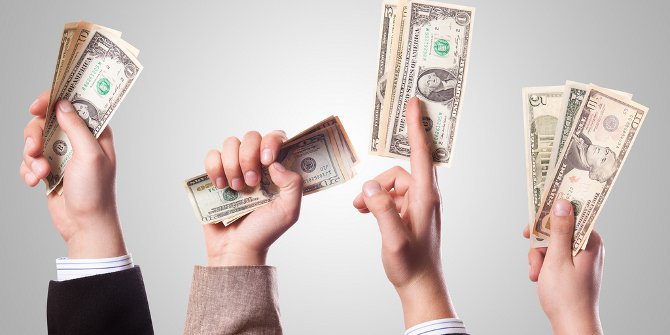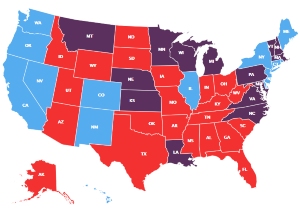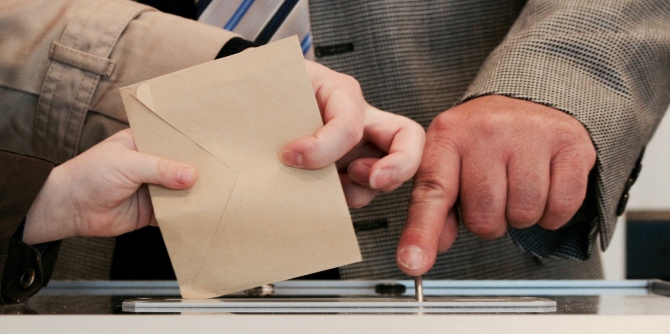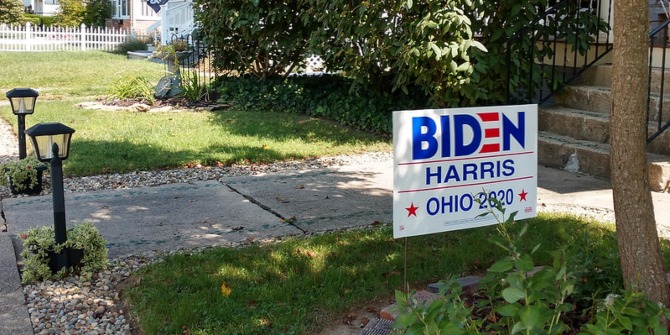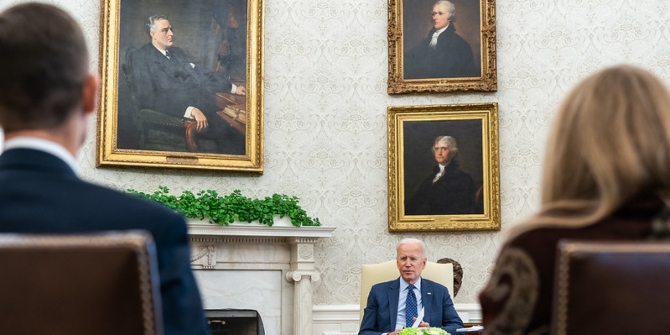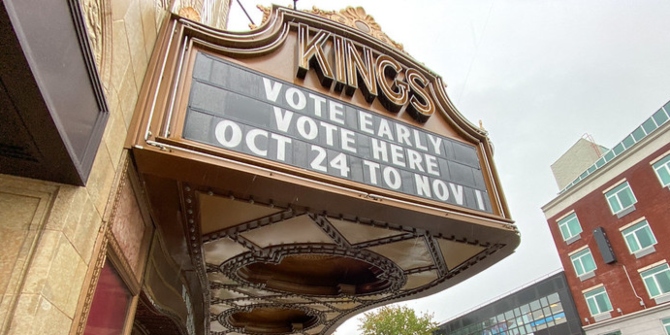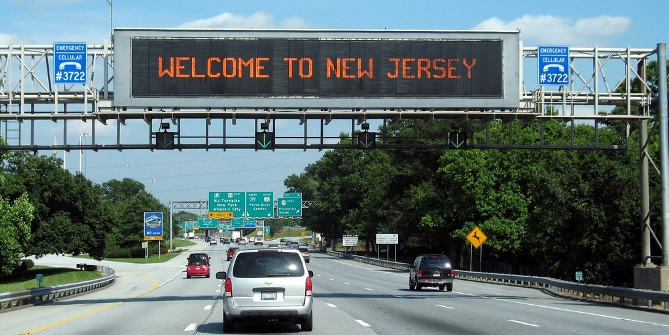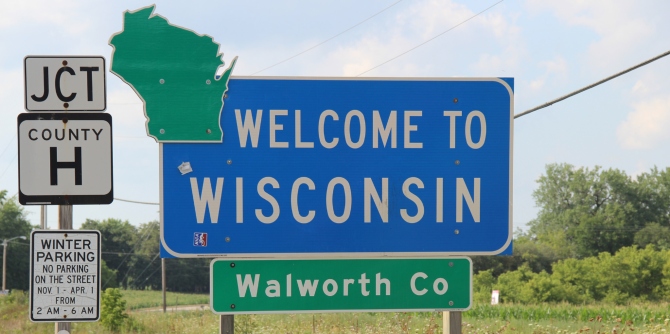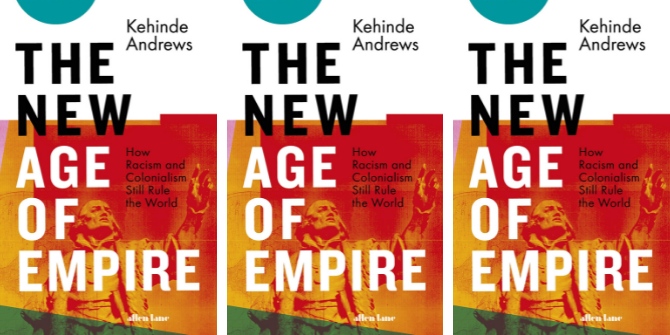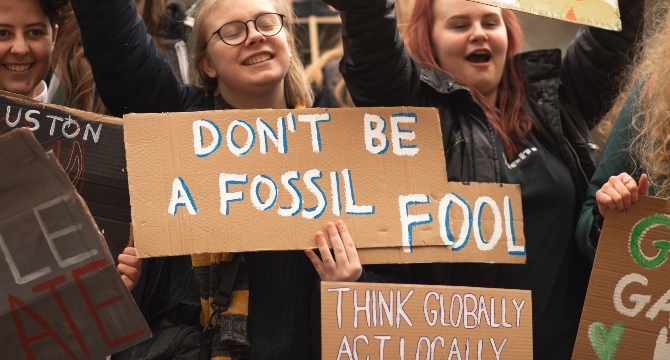 There is no doubt that contemporary politics costs money, but many have become increasingly frustrated with the amounts being raised through candidates SuperPACs, claiming that they act as vehicles for the wealthy to influence politics. Melissa M. Smith writes that while the Democratic Party has historically rejected such fundraising, the political reality of the 2016 campaign means that candidates such as Hillary Clinton must also hold out their hands for money from mega-donors.
There is no doubt that contemporary politics costs money, but many have become increasingly frustrated with the amounts being raised through candidates SuperPACs, claiming that they act as vehicles for the wealthy to influence politics. Melissa M. Smith writes that while the Democratic Party has historically rejected such fundraising, the political reality of the 2016 campaign means that candidates such as Hillary Clinton must also hold out their hands for money from mega-donors.
US politicians can’t quite make up their minds about campaign finance reform. On the one hand, most of them say some kind of reform is necessary. But on the other hand —the one that pulls in checks from wealthy donors — they can’t resist the temptation.
It would be silly to propose that politicians, especially those in Washington, get elected without major infusions of cash. It simply takes a lot of money to get messages out, finance campaigns, and keep the jets in the air.
But it can look disingenuous when presidential candidates moan about the ethics of accepting Super PAC donations and then turn around and pocket the checks.
For instance, once upon a time, Democrats hated Super PACs. They shunned the organizations as being distasteful, and they lamented the fact that just a few wealthy individuals could have such a great impact on the political process.
Hillary Clinton has traditionally been one of those candidates reluctant to raise money through Super PACs. On Sept. 12 of this year, Clinton even announced a new set of proposals that would curb anonymous political donations — so-called dark money — and set up a federal matching program for small donations. She was praised for laying out the plan, although some people noted that she also reminded those who were listening that these changes hinge on her election.
But now, the Democratic Party seems to be singing a different tune. Just one week after Clinton’s campaign finance reform proposals, top election lawyers for the Democrats filed an emergency request with the Federal Election Commission (FEC) asking that they be allowed to tighten relationships between candidates and Super PACs. Republicans pounced on the news, saying that Democrats were trying to embarrass Republicans — who are essentially already doing this — while also getting permission to exploit similar loopholes.
Credit: 401(K) 2012 (Flickr, CC-BY-SA-2.0)
The request boils down to asking the FEC for permission to openly raise money for Super PACs before a candidate declares for an office (as Jeb Bush did), and to also coordinate with Super PACs during election campaigns (as some allege Republican presidential candidates are now doing). All of the Democratic attorneys who signed the request work at Perkins Coie, the firm that represents the party’s congressional campaign committees — as well as Hillary Clinton’s presidential campaign.
While Clinton skirted the edges of Super PAC involvement in the past, she has been tirelessly working this summer to help Priorities USA Action raise millions of dollars to support her presidential race. The Super PAC had raised more than $40 million by September, which is a much smaller amount than that accumulated by Republican presidential candidates, some of whom have received multiple donations of more than $10 million each from Super PACs. It was only a few months ago that Clinton was calling for a constitutional amendment to create limits on campaign donations.
The money gap between Republican hopefuls and Clinton’s own war chest seems to have motivated her to figuratively hold her nose while holding out her hand for these mega-donations, even as her main opponent, Vermont Senator Bernie Sanders, has rejected money from Super PACs. For some, this makes her call for campaign finance reform seem a bit hollow.
In the 2012 presidential race, President Barack Obama was also loathe to do business with Super PACs. But he realized that it would be necessary to make use of one in order to be competitive with Mitt Romney and the Republican Party, and so Priorities USA was formed. It went on to spend $75 million on ads for the president, but he never attended any of the events to raise money for the organization.
Clinton and Sanders aren’t alone in questioning the ethics of accepting anonymous donations. Sen. Lindsey Graham of South Carolina and Gov. Chris Christie of New Jersey — both of whom are Republican presidential candidates — have expressed concern about a process in which candidates don’t really know the sources of large donations. Sen. Rand Paul of Kentucky has also called for reforms. Even Sen. Ted Cruz of Texas, who has raked in more than $30 million in Super PAC funds, says that he told his daughter that to run for office a candidate must “disconnect your shame sensor.” Donald Trump, who admits to being part of the other end of this process in the past, has also called for reforms.
While liberals generally dislike Super PACs and the removal of aggregate limits on personal contributions, Republicans have a track record of supporting the changes. But some of them are speaking more openly about the quest for cash, especially since some of the big donors for the 2016 presidential race have been holding “auditions” for candidates before handing over large checks. If the billionaires don’t think a candidate will support a specific cause or issue, or if they don’t think a candidate can win, then their money goes somewhere else. Candidates court the major donors, or they depend on major allies to woo potential Super PAC donations. And it’s not just presidential candidates who are chasing the cash. An article earlier this year in the Atlantic stated that members of Congress now spend up to 12 hours a day raising money.
Few, if any, enjoy this task, and who could blame them? Most people who are elected to Congress are successful, and they aren’t used to asking for someone to help them pay their bills. But stuffing the election coffer is expensive, and it is necessary. Without a healthy re-election bank account to intimidate potential challengers, more opponents will step into the ring, and that means even more fundraising.
The request before the FEC indicates that Democrats are interested in setting up single-candidate PACs — which most major presidential candidates now have — for Congressional races and running them as affiliates of the House Majority PAC and the Senate Majority PAC. So, the quest for large cash infusions is now filtering down to the House and Senate, with state races probably not far behind.
Whether the FEC, which is widely regarded as dysfunctional and unlikely to reach anything beyond a deadlocked vote, will even take up the emergency request is unknown. But some theorize that even a deadlocked vote would be a green light for Democrats to move forward.
And what about campaign finance reform? Democrats seem to be pushing it as a presidential campaign issue, but Republicans are largely ignoring it. The public doesn’t seem to be happy about the state of political financial affairs, but in public opinion polls the issue never rises to the level of other major concerns, such as the economy.
Regardless of how the public feels about the topic, no changes will be made until after the 2016 election. Until then, candidates might complain about the process, but it won’t stop them from holding out their hands for large donations.
Please read our comments policy before commenting.
Note: This article gives the views of the author, and not the position of USAPP – American Politics and Policy, nor the London School of Economics.
Shortened URL for this post: http://bit.ly/1L1OskK
_________________________________
 Melissa M. Smith – Mississippi University for Women
Melissa M. Smith – Mississippi University for Women
Melissa M. Smith is an Assistant Professor in the Department of Communication at Mississippi University for Women. Her research focuses on US elections, particularly campaign finance reform. Her work has appeared in several journals, and she is the co-author of two books, Campaign Finance Reform: The Political Shell Game, and Dark Money, Super PACs, and the 2012 Election, both published by Lexington Books.

